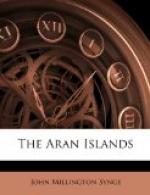The satisfaction of the people was immense. They shrieked and hugged each other with delight, and it is likely that they will hand down these animals for generations in the tradition of the island.
Two hours later the other party returned, driving three lean cows before them, and a start was made for the slip. At the public-house the policemen were given a drink while the dense crowd that was following waited in the lane. The island bull happened to be in a field close by, and he became wildly excited at the sight of the cows and of the strangely-dressed men. Two young islanders sidled up to me in a moment or two as I was resting on a wall, and one of them whispered in my ear—’Do you think they could take fines of us if we let out the bull on them?’
In face of the crowd of women and children, I could only say it was probable, and they slunk off.
At the slip there was a good deal of bargaining, which ended in all the cattle being given back to their owners. It was plainly of no use to take them away, as they were worth nothing.
When the last policeman had embarked, an old woman came forward from the crowd and, mounting on a rock near the slip, began a fierce rhapsody in Gaelic, pointing at the bailiff and waving her withered arms with extraordinary rage.
‘This man is my own son,’ she said; ’it is I that ought to know him. He is the first ruffian in the whole big world.’
Then she gave an account of his life, coloured with a vindictive fury I cannot reproduce. As she went on the excitement became so intense I thought the man would be stoned before he could get back to his cottage.
On these islands the women live only for their children, and it is hard to estimate the power of the impulse that made this old woman stand out and curse her son.
In the fury of her speech I seem to look again into the strangely reticent temperament of the islanders, and to feel the passionate spirit that expresses itself, at odd moments only, with magnificent words and gestures.
Old Pat has told me a story of the goose that lays the golden eggs, which he calls the Phoenix:—
A poor widow had three sons and a daughter. One day when her sons were out looking for sticks in the wood they saw a fine speckled bird flying in the trees. The next day they saw it again, and the eldest son told his brothers to go and get sticks by themselves, for he was going after the bird.
He went after it, and brought it in with him when he came home in the evening. They put it in an old hencoop, and they gave it some of the meal they had for themselves;—I don’t know if it ate the meal, but they divided what they had themselves; they could do no more.
That night it laid a fine spotted egg in the basket. The next night it laid another.
At that time its name was on the papers and many heard of the bird that laid the golden eggs, for the eggs were of gold, and there’s no lie in it.




